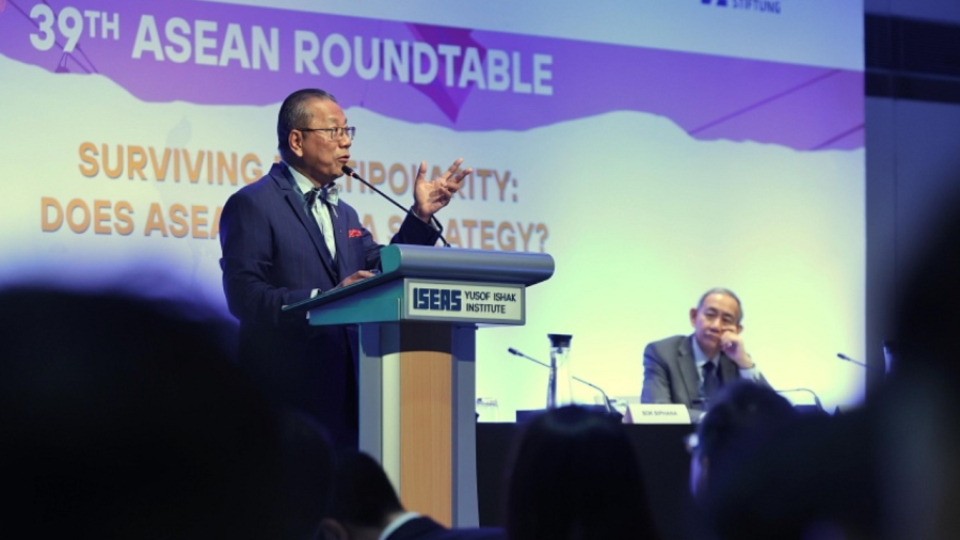SINGAPORE – (ANN/THE STRAITS TIMES) – ASEAN may need a strategic “reboot” to address global challenges, including intensifying US-China competition, according to insights shared at a regional forum on October 28. The call for reassessment comes amid growing pressure on the 10-member bloc to navigate complex geopolitical dynamics and maintain its centrality.
“There is mounting pressure on ASEAN to pick sides, particularly in areas like technology and supply chains,” said Cambodian Senior Minister Sok Siphana. “This dilemma is deeper than it appears, as we will likely face situations where we must make choices,” he added.
The regional forum, organised by the ASEAN Studies Centre at the ISEAS – Yusof Ishak Institute, brought together diplomats, academics, and thought leaders to examine ASEAN’s evolving role and challenges. Speakers highlighted issues ranging from territorial disputes and economic nationalism to rising protectionism, the US-China rivalry, and conflicts in Europe, the Middle East, and Myanmar.

Dr. Sok, who serves as Cambodia’s Senior Minister in charge of Multilateral Trade and Economic Affairs, noted that the US has recalibrated its global engagements over the past decade, while China has become increasingly assertive in shaping its own world order.
The US remains the leading source of foreign direct investment in ASEAN, while trade with China has nearly tripled from USD235.5 billion in 2010 to USD696.7 billion in 2023, underscoring the bloc’s interwoven relationships with both powers.
While Dr. Sok praised the “ASEAN Way” – a principle of consensus and non-interference – for enabling dialogue and managing sensitive geopolitical issues, he called for a “reboot” to better address contemporary challenges. “We need a visionary reboot, not just more infrastructure or free trade agreements. ASEAN must think outside the box to address protracted issues like the Myanmar crisis,” he said.
The minister warned that ASEAN must defend a stable, multipolar world order in the Indo-Pacific without isolating China. He emphasised that the region must avoid becoming another battleground for great-power rivalry, as it did during the Cold War.
ASEAN, established in 1967 against the backdrop of Cold War tensions, has navigated through conflicts such as the Vietnam War and the Cambodian Genocide, which Dr. Sok described as some of the region’s “darkest periods.”
During the forum, ISEAS Director and CEO Choi Shing Kwok commended ASEAN’s achievements in maintaining peace and stability, but he cautioned that the bloc’s “Goldilocks period” of balanced growth and stability may be coming to an end. “This is a timely moment to reassess the pressing issues in the region and determine ASEAN’s response to ongoing global challenges,” he said.
Some speakers questioned the effectiveness of the “ASEAN Way,” particularly given slow progress on issues like the Myanmar crisis and tensions in the South China Sea. Dr. Sok, however, highlighted ASEAN’s success in reframing great-power rivalry as an opportunity for cooperation rather than a zero-sum game.
The preservation of a rules-based international order is critical, he added, citing Cambodia’s decision to condemn Russia’s invasion of Ukraine at the UN despite its long-standing ties with Moscow.
Former World Bank managing director Mari Pangestu, appointed as Indonesia’s special envoy on trade by President Prabowo Subianto, echoed the need for deeper economic integration within ASEAN. She advocated for mechanisms to enhance trade, digital cooperation, and green-energy initiatives, noting that intra-ASEAN trade currently accounts for about 20 percent of the bloc’s total trade, a figure she believes can be improved.
Dr. Mari stressed the importance of a cohesive approach across sectors, such as economics, technology, and security. “We need integration across these areas; fragmentation is not an option,” she said.
The forum underscored ASEAN’s role in bringing diverse powers to the table through its convening authority and normative influence, particularly via the ASEAN Charter. Dr. Sok reaffirmed the importance of ASEAN’s central role in regional diplomacy, adding, “ASEAN remains the primary platform in the region for multilateral cooperation. It’s essential that major powers support, rather than undermine, our efforts.”



















































